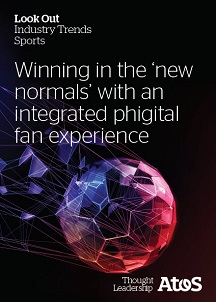How does sport return to action in the ‘new normals’?
COVID-19 has changed every aspect of our lives; the way we work, rest and play. We found ourselves in an unprecedented situation. Sporting events were canceled. We had to find new ways to stay fit, stay entertained and, above all, stay safe. As we emerge from lockdown, every sports organization must adapt – not only to keep staff, athletes and fans safe but also to survive in this new normal.
The pandemic is accelerating digital adoption. With the right phigital strategies, the sports industry can emerge from the crisis stronger and more popular than ever. Phigital, which blurs the lines between the physical and digital worlds, will be vital for both keeping those physically present safe and recovering the gate revenues lost because many fans are unable to attend. To compensate, organizations must increase media rights by providing the right mix of TV and direct-to-customer streaming services. This will also help them understand their fans better and, in doing so, maximize sponsorship and merchandising opportunities.
Keeping everyone safe at the venue
Sports organizations must reinvent the layout of sporting venues to comply with social distancing. More space will be required for a fewer number of spectators, with outdoor spaces more highly sought after. Upcoming events will become more digital and contactless than ever.
Technology will help sports organizations get back on track. The right combination of crowd safety and capacity management, physical security, access control with temperature cameras, streaming, collaboration tools, social media and gamification will allow fans to attend safely but in a way very different from before.
Artificial Intelligence (AI) can help provide a hyper-personalized experience and elevate engagement along the fan journey. During physical events, the Internet of Things (IoT) and Edge computing can help trace the flow of people to keep events and venues safe. Augmented Reality (AR) could mix virtual objects with the real world to bring fans closer to their heroes without any physical contact.
Enjoying sport here, there and everywhere
Mobile and social already allow fans to dip in and out of events, from anywhere and on any device. Supported by High-Performance Computing (HPC), Big Data and AI can deliver a compelling phigital fan experience based on the information obtained from fan interactions. With the capacity to learn and become more accurate and insightful over time, they could identify the content most likely to gain each fans’ interest, for instance.
With the increase in media consumption accelerating the adoption of direct-to-customer streaming services for distributing sports content, organizations can leverage technology to not only personalize content but also monetize data. Notably, quantifiable tracking and new sponsorship assets can enhance sponsorship opportunities.
Sports organizations can learn about full customer experience and multi-modal continuity from the media industry. They can also learn about advertising, online merchandising from the retail industry.
Adapting to the new normals to come
Agility and flexibility remain essential as we address the many ‘new normals’ to come. In the midst of the crisis, we repurposed our volunteer portal for major sporting events, adapting it to help healthcare organizations choose volunteers and match them to specific roles based on skillset and availability.
For future sporting events, we have leveraged blockchain and AI to reduce fraud. Together these technologies can enforce identity, safeguarding the secure delivery of the health certificates needed to ensure events are safe and allowing the validity of tickets to be verified.
As the pandemic plays its story out, the ‘new normal’ will continue to look and evolve differently in each country, even in cities across a country. And throughout its evolutions, Atos can leverage its cross-industry expertise to help you adapt. After all, healthcare is now a critical adjacent industry for sports, joining media, transportation, smart cities, retail and others that together make sporting events a success.
Our Sports Look Out publication explores the trends of today and tomorrow impacting sports organizations, and the initiatives and technologies that can help organizations ensure they are COVID-ready. While I’ve shared a few here, our “Winning in the ‘new normals’ with an integrated phigital fan experience” report also shares the concrete steps sporting organizations should take for a successful future.
By Fabrice Doreau, Head of Strategic Engagement for the sports industry
Posted on July 22
